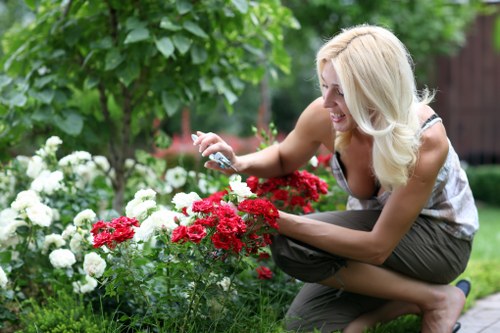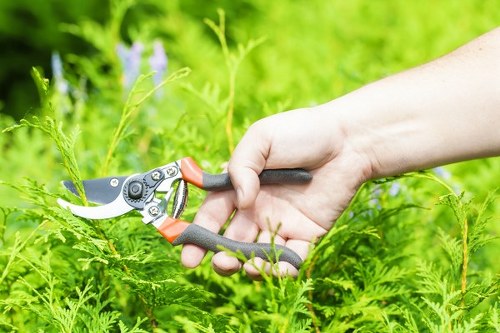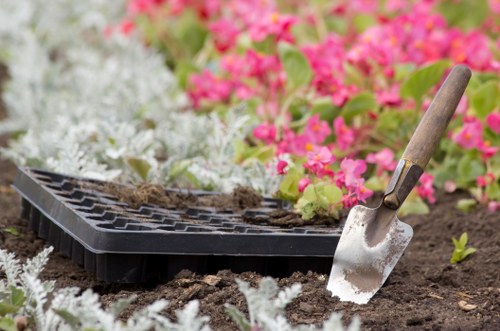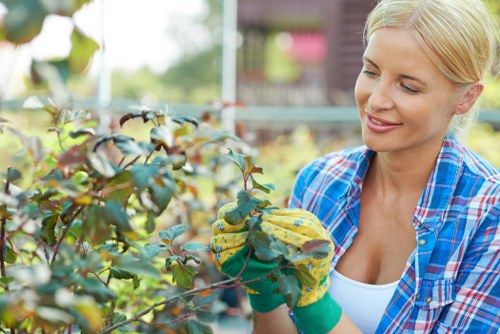Garden Fencing Custom House: Enhancing Your Outdoor Space

Installing a garden fence around your Custom House property is an excellent way to enhance both the aesthetic appeal and security of your outdoor space. Whether you're looking to keep pets safe, create a private sanctuary, or simply add a decorative touch, garden fencing offers a versatile solution.
Choosing the right type of fence involves considering various factors, including the material, height, and style that best suits your garden’s design. From classic wooden fences to modern metal options, there's a plethora of choices to match your taste and budget.
In addition to functionality, garden fencing plays a crucial role in defining property boundaries and adding structure to your landscape design. Proper fencing can create a cohesive look, complementing plants, pathways, and other garden features.
Types of Garden Fencing

When selecting a fence for your Custom House garden, understanding the different types available is essential. Each type offers unique benefits and can be tailored to meet specific needs.
Wooden Fences: Wooden fences are timeless and provide a natural look that blends seamlessly with garden environments. They can be painted or stained to match your home’s exterior.
Metal Fences: Metal fences, such as wrought iron or aluminum, are durable and require minimal maintenance. They are ideal for adding an elegant and sophisticated touch to your garden.
Choosing the Right Material

The material of your garden fence impacts its longevity, appearance, and maintenance requirements. Here are some popular options:
- Wood: Offers versatility and can be customized with various finishes.
- Vinyl: Resistant to weather and pests, making it low-maintenance.
- Metal: Provides strength and a classic look, suitable for both traditional and modern gardens.
Consider the climate in Custom House and how different materials withstand local weather conditions.
It's also important to think about the level of privacy you desire. For more secluded spaces, taller fences with narrower gaps work best.
Design Considerations

Designing your garden fence involves more than just selecting a material. Consider the overall theme of your garden and how the fence will integrate with existing features.
Height and Scale: Ensure the fence height complements the size of your garden and property. Taller fences offer more privacy, while shorter ones can enhance visibility.
Style: Match the fence style to your home's architecture. For example, a Victorian-style home may pair well with ornate ironwork, while a cottage-style home might benefit from a simple wooden picket fence.
Color and Finish

The color of your fence can either make it a statement piece or help it blend into the surroundings. Neutral colors like white, black, or natural wood tones are versatile choices.
Alternatively, bold colors can add a pop of personality and make your fence a focal point of the garden.
- Neutral Tones: Timeless and easy to match with various garden elements.
- Bold Colors: Can highlight specific areas or features in the garden.
Protective finishes not only enhance the appearance but also extend the life of your fence by preventing damage from the elements.
Installation Tips

Proper installation is key to ensuring your garden fence is both functional and long-lasting. Here are some tips to consider:
- Plan the Layout: Measure your garden space and mark the fence boundaries accurately.
- Prepare the Ground: Clear any debris and ensure the ground is level for a stable fence.
- Use Quality Materials: Invest in high-quality materials to avoid frequent repairs and replacements.
- Consider Professional Help: For complex installations, hiring a professional can ensure the fence is installed correctly.
Regular maintenance, such as cleaning and inspecting for damage, will help your fence remain in good condition over time.
Don't forget to check local regulations and obtain any necessary permits before starting your fencing project.
Maintenance and Care

Maintaining your garden fence is essential for preserving its appearance and functionality. The maintenance required depends on the material:
- Wood: Requires regular painting or staining to protect against moisture and pests.
- Metal: Periodic cleaning and rust treatment are necessary, especially in humid climates.
- Vinyl: Generally low-maintenance but should be cleaned to remove dirt and debris.
Inspect your fence regularly for any signs of wear or damage. Addressing issues early can prevent more significant problems down the line.
Implementing a maintenance schedule will help keep your garden fence looking its best year-round.
Eco-Friendly Options

For environmentally conscious homeowners, eco-friendly fencing options are available. Sustainable materials, such as reclaimed wood or bamboo, are popular choices that reduce environmental impact.
Additionally, choosing locally sourced materials can minimize transportation emissions and support local businesses in Custom House.
- Reclaimed Wood: Adds character and reduces the demand for new lumber.
- Bamboo: Fast-growing and renewable, making it a sustainable alternative.
Eco-friendly fences not only benefit the environment but also add a unique and natural aesthetic to your garden.
Cost Considerations

Budgeting for your garden fence involves considering both upfront costs and long-term maintenance expenses. Different materials and styles come with varying price points.
Wooden Fences: Generally affordable but may require more maintenance over time.
Metal Fences: Higher initial cost but offer greater durability and lower maintenance.
- Initial Cost: Depends on material, height, and length of the fence.
- Maintenance Cost: Factor in ongoing care to maintain the fence's appearance and functionality.
- Longevity: Consider how long the fence will last before needing replacement.
Choosing a fence that balances cost and quality will ensure you get the best value for your investment.
Exploring different suppliers in Custom House can help you find competitive pricing and quality materials.
DIY vs. Professional Installation

Deciding between a DIY project and hiring professionals depends on your skill level, time, and budget. While DIY installation can save money, it requires careful planning and effort.
Professional installers offer expertise and ensure the fence is built to specification, which can be beneficial for more complex designs.
- DIY: Cost-effective but time-consuming and requires proper tools.
- Professional: Higher cost but offers reliability and quality workmanship.
Evaluate your capabilities and resources before making a decision to ensure the best outcome for your garden fencing project.
Regardless of the method chosen, attention to detail during installation will enhance the fence's durability and appearance.
Local Relevance: Fencing Around Custom House
Custom House is surrounded by several charming areas that offer unique features for garden fencing. Here are some nearby areas to consider:
- East India Dock Road: Known for its picturesque waterfront, perfect for scenic garden views.
- Barnard Quay: Offers contemporary urban vibes, ideal for modern fencing styles.
- West Silvertown A blend of industrial and green spaces, suitable for durable metal fences.
- Blackwall Features historic architecture, making classic wooden fences a great match.
- Canning Town A vibrant area with diverse garden styles, allowing for customizable fencing options.
- Custom House Station Area: Convenient for sourcing fencing materials and professional services.
- Alfrey Park: A green oasis, perfect for eco-friendly fencing solutions.
- East Ham Diverse community with various garden design influences.
- Stratford Urban redevelopment area, ideal for sleek and modern fence designs.
- North Woolwich Combining residential and commercial spaces, suitable for both decorative and security fencing.
- Croydon Road: Offers a mix of traditional and contemporary garden aesthetics.
- Ilford Close proximity with ample gardening spaces requiring reliable fencing.
- Forest Gate Known for its community gardens, making sturdy and attractive fences essential.
- Dagenham Residential area with a need for privacy and security in garden fencing.
- Chadwell Heath Suburban setting perfect for classic and elegant fencing options.
Each of these areas has its unique characteristics, allowing homeowners in Custom House to choose fencing that complements their specific garden style and neighborhood ambiance.
Conclusion
Investing in a garden fence for your Custom House property is a decision that enhances both the beauty and functionality of your outdoor space. By carefully selecting the right materials, design, and installation method, you can create a lasting and appealing boundary that meets your needs.
Consider the local areas and their unique features when planning your fencing project to ensure it harmonizes with the surrounding environment. With proper maintenance and thoughtful design, your garden fence will remain a valuable asset for years to come.
Frequently Asked Questions
- What is the best material for garden fencing in Custom House?
The best material depends on your specific needs and preferences. Wooden fences offer a natural look, while metal fences provide durability and low maintenance. Consider factors like climate, budget, and desired aesthetics when choosing.
- How much does it cost to install a garden fence?
The cost varies based on the material, height, length, and complexity of the installation. On average, prices can range from £20 to £100 per meter. Getting quotes from local suppliers and installers in Custom House can provide a more accurate estimate.
- Do I need a permit to install a fence in Custom House?
In many cases, fencing installations require permits, especially if they exceed a certain height or are near property lines. It's essential to check with the local council or planning department in Custom House to ensure compliance with regulations.
- How do I maintain my garden fence?
Maintenance depends on the material. Wooden fences may need regular painting or staining, metal fences require rust prevention treatments, and vinyl fences generally only need cleaning. Regular inspections for damage and timely repairs also help maintain the fence's condition.
- Can I install a garden fence myself?
Yes, if you have the necessary skills and tools, DIY installation can save money. However, for complex designs or larger projects, hiring a professional installer ensures the fence is built correctly and meets all regulations.